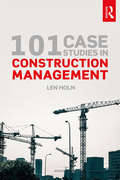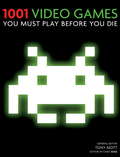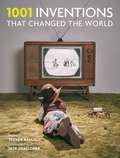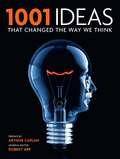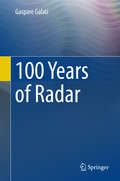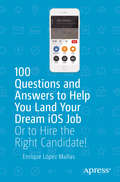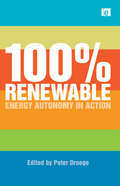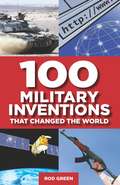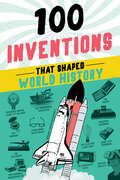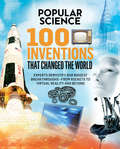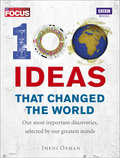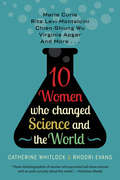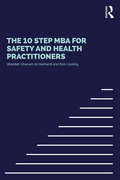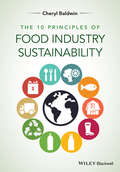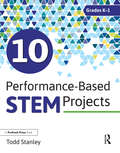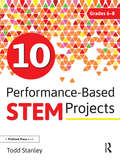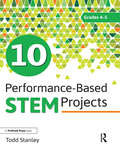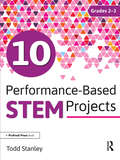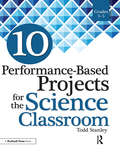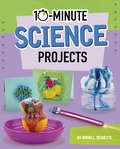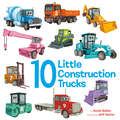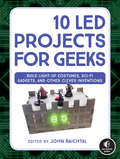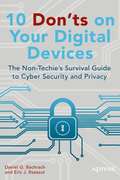- Table View
- List View
101 Case Studies in Construction Management
by Len HolmThis book provides 101 real-life construction management case studies from an author with over 40 years’ experience in the construction industry and as a lecturer in construction management. Over 14 chapters, Len Holm has included case studies from real jobsites that cover organization, procurement, estimating, scheduling, subcontractors, communications, quality and cost control, change orders, claims and disputes, safety, and close-outs. Other hot topics covered include BIM, sustainability, and lean. Each case is written in straightforward language and designed to test the reader’s independent and critical thinking skills to develop their real-world problem-solving ability. The cases are open to interpretation, and students will need to develop their own opinions of what’s presented to them in order to reach a satisfactory solution. The cases are ideal for use in the classroom or flipped classroom, for individual or group exercises, and to encourage research, writing, and presenting skills in all manner of applied construction management situations. Such a broad and useful selection of cases studies cannot be found anywhere else. While there is often no "right" answer, the author has provided model solutions to instructors through the online eResource.
101 Arena Exercises for Horse & Rider (Read & Ride)
by Cherry Hill Carla WennbergTake your riding to a new level! Bringing together recognized classic exercises for both English and Western riders plus her own original patterns and maneuvers, Cherry Hill provides an array of drills that will improve your riding technique. Whether you are a rider interested in expanding your repertoire or an instructor looking for new drills, these exercises will add excitement and variety to your training.
1001 Video Games You Must Play Before You Die: You Must Play Before You Die (1001)
by Tony MottIn fewer than fifty years videogames have become one of the most popular forms of entertainment, but which are the best games, the ones you must play? This action packed book presents the best videogames from around the world - from 80's classic Donkey Kong to Doom, Frogger and Final Fantasy. Covering everything from old favourites to those breaking new ground, these are the games that should not be missed.Video game expert Tony Mott presents 1001 of the best video games from around the world and on all formats, from primitive pioneering consoles like Atari's VCS to modern-day home entertainment platforms such as Sony's PlayStation 3. 1001 VIDEO GAMES defines arcade experiences that first turned video gaming into a worldwide phenomenon such as Space Invaders, Asteroids, and Pac-Man - games that made the likes of Atari, Sinclair and Commadore household names. It also includes the games that have taken the console era by storm from Nintendo Wii to Sony Playstation and beyond - games of the modern era that have become cultural reference points in their own right including multi-million selling series such as Halo, Grand Theft Auto and Resident Evil.For aficionados this is a keepsake - charting the highlights of the past fifty years giving them key information for games they must play. For those just discovering the appeal of gaming this extensive volume will provide everything they need to ensure they don't miss out on the games that revolutionized this overwhelmingly popular medium.
1001 Inventions That Changed the World (1001 Series)
by Jack ChallonerThe history of the world through 1,001 inventions—from prehistoric times to the present day.1001 Inventions That Changed the World is an enthralling guide to the world&’s most important scientific and technological advances. Authoritatively written by a team of historians, scientists, and anthropologists, this book tells the stories behind these innovations, presenting a comprehensive history of the world through invention and discovery. From stone tools and fire at the dawn of humankind to today&’s self-driving cars, inventions have moved society forward at a remarkable pace. This informative volume shows just how much some of the inventions that we take for granted have transformed the world.
1001 Ideas That Changed the Way We Think (1001 Series)
by Arthur CaplanTrace the progress of humanity—from prehistoric times to the present day—through 1,001 ideas that changed how we connect to each other and the world around us.From the ability to control fire to augmented reality, the power of humanity&’s ideas has revolutionized how we live and experience the world around us. 1001 Ideas That Changed the Way We Think looks at the innovations and concepts that have played a key role in our progress since before recorded history. Covering a wide range of topics—from political and religious ideas to modern innovations such as social media and clean energy—this captivating volume offers a comprehensive look at how human ideas have evolved over the millennia.
100 Years of Radar
by Gaspare GalatiThis book offers fascinating insights into the key technical and scientific developments in the history of radar, from the first patent, taken out by Hülsmeyer in 1904, through to the present day. Landmark events are highlighted and fascinating insights provided into the exceptional people who made possible the progress in the field, including the scientists and technologists who worked independently and under strict secrecy in various countries across the world in the 1930s and the big businessmen who played an important role after World War II. The book encourages multiple levels of reading. The author is a leading radar researcher who is ideally placed to offer a technical/scientific perspective as well as a historical one. He has taken care to structure and write the book in such a way as to appeal to both non-specialists and experts. The book is not sponsored by any company or body, either formally or informally, and is therefore entirely unbiased. The text is enriched by approximately three hundred images, most of which are original and have been accessed by detailed searches in the archives.
100 Questions and Answers to Help You Land Your Dream iOS Job: Or to Hire the Right Candidate!
by Enrique López MañasAre you an iOS developer, looking forward to your next career move? Or are you interviewing for positions at your company or start-up? Either way, "100 Questions and Answers to help you land your Dream iOS Job" has been thought for you. With 100 Questions and Answers categorized by seniority and with reviews from some of the top iOS engineers worldwide, this book will level up how you make interviews for your favorite platform.
100 Per Cent Renewable: Energy Autonomy in Action
by Peter DroegeThe greatest challenge of our time is to build a world based on the sustainable use of renewable power. Our massive dependence on fossil fuels has upset the very climatic system that made human evolution possible. The global economy and its financial system are in jeopardy, running hot on overtly cheap yet increasingly costly and fast depleting oil. A 100% renewable world is seen by many as an impossible dream in anything but the very long term. But not only do a growing number of initiatives and plans dare to make the change but many have already achieved it. This rich collection presents a series of pioneering efforts and their champions, and the paths to their successes. Ranging from initiatives by individuals to visions for companies, communities and entire countries, it defeats tired economic and technical counter-arguments, showing how the schemes featured not only can and do work but do so economically and with available technology. The book is introduced by incisive writing by Peter Droege, explaining the challenges and framing a roadmap towards a 100% renewable reality.
100 Military Inventions that Changed the World: That Changed The World
by Rod GreenNothing ensures the rapid development of new technology like the involvement of the military. <P><P>From the trebuchet and the cannon to the tank and the ballistic missile, military research programmes have produced the most devastating weapons imaginable, but military masterminds are responsible for a number of surprises along the way as well. Radar, walkie-talkies and the jet engine are more obvious examples of military inventions that are now in everyday use around the world, but there are plenty of items with which all of us come into contact on a daily basis that have been developed from military technology.<P>Rod Green describes how the microwave oven in your kitchen, the sat-nav in your car or the Internet that you use every day all owe their existence to the military as he takes us on a highly entertaining voyage of discovery through the world of military inventions ancient and modern.
100 Military Inventions that Changed the World: That Changed The World
by Philip RussellNothing ensures the rapid development of new technology like the involvement of the military. From the trebuchet and the cannon to the tank and the ballistic missile, military research programmes have produced the most devastating weapons imaginable, but military masterminds are responsible for a number of surprises along the way as well.Radar, walkie-talkies and the jet engine are more obvious examples of military inventions that are now in everyday use around the world, but there are plenty of items with which all of us come into contact on a daily basis that have been developed from military technology. Rod Green describes how the microwave oven in your kitchen, the sat-nav in your car or the Internet that you use every day all owe their existence to the military as he takes us on a highly entertaining voyage of discovery through the world of military inventions ancient and modern.
100 Inventions That Shaped World History (100 Series)
by Bill YenneFascinating stories behind 100 of the most important inventions in history, for kids 8 and upThis fast-paced journey through the most vital developments and inventions of all time features:100 easy-to-read stories: Find out how each invention came to be!Illustrations: Each entry includes an illustrated image of the invention to help bring history to life!A timeline, trivia questions, project ideas and more: Boost your learning and test your knowledge with fun activities and resources!From the compass to the printing press, television to virtual reality, readers will learn about 100 of the most important inventions, advancements, and discoveries that have changed the course of human history. Organized chronologically, this fast-paced journey through the history of technology will help kids understand how their favorite modern conveniences came to be.
100 Inventions That Changed the World (Popular Science)
by The Editors of Popular ScienceFrom safety pins to steam engines to cell phones, the stories behind innovations that have transformed everyday lives. We take thousands of inventions for granted, using them daily and enjoying their benefits. But how much do we really know about their origins and development? This absorbing new book tells the stories behind the inventions that have changed the world, with details about: Convenience items, such as safety pins, toothbrushes, and bifocals Weapons of war, including explosives, gunpowder, and shrapnel shells Industrial advances, such as the steam engine and the power loom for weaving Transportation advances, including the airplane, the diesel engine, the automobile, and the air-inflated rubber tire Electronic marvels, including color television, the microprocessor, the personal computer, the compact disc, and the cell phone Medical advances, from antiseptic surgery to the electron microscope...and much more You&’ll also learn more about many inventors and pioneers of science and technology—including Eli Whitney, James Watt, Benjamin Franklin, Henry Bessemer, Thomas Edison, J.B. Dunlop, the Wright Brothers, Werner von Braun, Jonas Salk, J. Robert Oppenheimer, and others.
100 Ideas that Changed the World: Our Most Important Discoveries, Selected By Our Greatest Minds
by Jheni OsmanEvery once in a while, an idea comes along that makes the entire world sit up and take notice. From the earliest understandings of our place in the solar system, via Darwinism, DNA, neutrons and quarks, right up to the theories that are pushing the boundaries of our knowledge today, we are forever propelled forward by our most gifted scientific minds. In this fascinating book, former BBC Focus magazine editor Jheni Osman explores 100 of the most forward thinking, far-reaching and downright inspired ideas and inventions in history, each nominated by experts from all fields of science and engineering. With selections from established authorities such as Brian Cox, Patrick Moore, Richard Dawkins and Marcus du Sautoy, Osman covers topics as diverse as the Big Bang, vaccination, computing, radioactivity, human genomes, the wheel and many more. Each essay looks at the logic behind these great inventions, discoveries, theories and experiments, studying the circumstances that brought them into being and assessing the impact that they had on the world at large. An intriguing and thought-provoking collection, 100 Ideas that Changed the World offers us a glimpse into the minds behind history's greatest eureka moments.
10 Women Who Changed Science and the World (Trailblazers, Pioneers, and Revolutionaries)
by Rhodri Evans Catherine WhitlockSpanning the nineteenth and twentieth centuries, this fascinating history explores the lives and achievements of great women in science across the globe. Ten Women Who Changed Science and the World tells the stories of trailblazing women who made a historic impact on physics, biology, chemistry, astronomy, and medicine. Included in this volume are famous figures, such as two-time Nobel Prize winner Marie Curie, as well as individuals whose names will be new to many, though their breakthroughs were no less remarkable. These women overcame significant obstacles, discrimination, and personal tragedies in their pursuit of scientific advancement. They persevered in their research, whether creating life-saving drugs or expanding our knowledge of the cosmos. By daring to ask ‘How?’ and ‘Why?’, each of these women made a positive impact on the world we live in today. In this book, you will learn about: AstronomyHenrietta Leavitt (United States, 1868–1921) discovered the period-luminosity relationship for Cepheid variable stars, which enabled us to measure the size of our galaxy and the universe. PhysicsLise Meitner (Austria, 1878–1968) fled Nazi Germany in 1938, taking with her the experimental results which showed that she and Otto Hahn had split the nucleus and discovered nuclear fission. Chien-Shiung Wu (United States, 1912–1997) demonstrated that the widely accepted ‘law of parity’, which stated that left-spinning and right-spinning subatomic particles would behave identically, was wrong. ChemistryMarie Curie (France, 1867–1934) became the only person in history to have won Nobel prizes in two different fields of science. Dorothy Crowfoot Hodgkin (United Kingdom, 1910–1994) won the Nobel Prize for Chemistry in 1964 and pioneered the X-ray study of large molecules of biochemical importance. MedicineVirginia Apgar (United States, 1909–1974) invented the Apgar score, used to quickly assess the health of newborn babies. Gertrude Elion (United States, 1918–1999) won the Nobel Prize for Physiology or Medicine in 1988 for her advances in drug development. BiologyRita Levi-Montalcini (Italy, 1909–2012) won the Nobel Prize for Physiology or Medicine in 1986 for her co-discovery in 1954 of Nerve Growth Factor (NGF). Elsie Widdowson (United Kingdom, 1906–2000) pioneered the science of nutrition and helped devise the World War II food-rationing program. Rachel Carson (United States, 1907–1964) forged the environmental movement, most famously with her influential book Silent Spring.
The 10 Step MBA for Safety and Health Practitioners
by Waddah S Ghanem Al Hashmi Rob CoolingAs an Occupational Safety and Health (OSH) practitioner have you ever wondered "How can I shape my career trajectory to reach a C-suite position in business?" Or perhaps—for those who do not aspire to positions of this nature; "How can I develop my ability to persuade and influence top management more effectively?" The 10 Step MBA for Safety and Health Practitioners answers these questions to enable you to achieve your personal and professional OSH goals. Presented over 10 steps encompassing a typical MBA programme, a transformational model establishes key themes which are deemed critical in understanding the world of business to exert greater influence: Strategic – aligning OSH to the overall direction of a business and creating a lasting OSH purpose that all stakeholders can relate to Cross-functional – understanding the different parts of an organisation and integrating OSH within business functions and ways of working Distinctive – looking for creative new ways of presenting OSH data and information to generate interest and enthusiasm. From strategy and leadership to organisational behaviour and human resource management, from marketing and brand management to interpersonal skills, this book shows you how to combine the best of your specialist knowledge with important business tools, so you can embed OSH at the heart of your company. The book is an indispensable reference for OSH practitioners who want to make a positive change in their careers and become more effective in influencing and leading change.
The 10 Principles of Food Industry Sustainability
by Cheryl J. BaldwinAlthough the food industry is beginning to make headway with its sustainability initiatives, substantially more progress is needed in order to feed the world's growing population sustainably. The challenge is that the topic of sustainability can seem overwhelming and there is limited information that is specific to the food industry.Written by an experienced food industry professional with years of experience in sustainability, The 10 Principles of Food Industry Sustainability inspires and informs the progress required to nourish the population, revitalize natural resources, enhance economic development, and close resource loops. The book makes this complex topic approachable and actionable by identifying the most pressing sustainability priorities across the entire food supply chain and showing, with tools and examples, how producers, processors, packers, distributors, marketers and retailers all play a role in advancing improvement. The book begins with an overview of the Principles of sustainability in the food industry: what they are and why they matter. Subsequent chapters focus on each of the Ten Principles in detail: how they relate to the food industry, their global relevance (including their environmental, health, and social impacts), and the best practices to achieve the potential of meaningful and positive progress that the Principles offer. Specific examples from industry are presented in order to provide scalable solutions and bring the concepts to life, along with top resources for further exploration.The Principles, practices, and potential of sustainability in the food industry covered in this book are designed to be motivating and to offer a much-needed and clear way forward towards a sustainable food supply.
10 Performance-Based STEM Projects for Grades K-1
by Todd Stanley10 Performance-Based STEM Projects for Grades K-1 provides 10 ready-made projects designed to help students achieve higher levels of thinking and develop 21st-century skills while learning about science, technology, engineering, and math. Projects are aligned to national standards and feature crosscurricular connections, allowing students to explore and be creative as well as gain an enduring understanding. Each project is linked to national STEM education goals and represents one of a variety of performance assessments, including oral presentations, research papers, and exhibitions. Included for each project are a suggested calendar to allow teachers to easily plan a schedule, mini-lessons that allow students to build capacity and gain an understanding of what they are doing, as well as multiple rubrics that can be used to objectively assess the performance of students. The lessons are laid out in an easy-to-follow format that will allow teachers to implement the projects immediately. Grades K-1
10 Performance-Based STEM Projects for Grades 6-8
by Todd Stanley10 Performance-Based STEM Projects for Grades 6-8 provides 10 ready-made projects designed to help students achieve higher levels of thinking and develop 21st-century skills while learning about science, technology, engineering, and math. Projects are aligned to national standards and feature crosscurricular connections, allowing students to explore and be creative as well as gain an enduring understanding. Each project is linked to national STEM education goals and represents one of a variety of performance assessments, including oral presentations, research papers, and exhibitions. Included for each project are a suggested calendar to allow teachers to easily plan a schedule, mini-lessons that allow students to build capacity and gain an understanding of what they are doing, as well as multiple rubrics that can be used to objectively assess the performance of students. The lessons are laid out in an easy-to-follow format that will allow teachers to implement the projects immediately. Grades 6-8
10 Performance-Based STEM Projects for Grades 4-5
by Todd Stanley10 Performance-Based STEM Projects for Grades 4-5 provides 10 ready-made projects designed to help students achieve higher levels of thinking and develop 21st-century skills while learning about science, technology, engineering, and math. Projects are aligned to national standards and feature crosscurricular connections, allowing students to explore and be creative as well as gain an enduring understanding. Each project is linked to national STEM education goals and represents one of a variety of performance assessments, including oral presentations, research papers, and exhibitions. Included for each project are a suggested calendar to allow teachers to easily plan a schedule, mini-lessons that allow students to build capacity and gain an understanding of what they are doing, as well as multiple rubrics that can be used to objectively assess the performance of students. The lessons are laid out in an easy-to-follow format that will allow teachers to implement the projects immediately. Grades 4-5
10 Performance-Based STEM Projects for Grades 2-3
by Todd Stanley10 Performance-Based STEM Projects for Grades 2-3 provides 10 ready-made projects designed to help students achieve higher levels of thinking and develop 21st-century skills while learning about science, technology, engineering, and math. Projects are aligned to national standards and feature crosscurricular connections, allowing students to explore and be creative as well as gain an enduring understanding. Each project is linked to national STEM education goals and represents one of a variety of performance assessments, including oral presentations, research papers, and exhibitions. Included for each project are a suggested calendar to allow teachers to easily plan a schedule, mini-lessons that allow students to build capacity and gain an understanding of what they are doing, as well as multiple rubrics that can be used to objectively assess the performance of students. The lessons are laid out in an easy-to-follow format that will allow teachers to implement the projects immediately. Grades 2-3
10 Performance-Based Projects for the Science Classroom: Grades 3-5
by Todd StanleyEach book in the 10 Performance-Based Projects series provides 10 ready-made projects designed to help students achieve higher levels of thinking and develop 21st-century skills. Projects are aligned to the Next Generation Science Standards, allowing students to explore and be creative as well as gain enduring understanding. Each project represents a type of performance assessment, including portfolios, oral presentations, research papers, and exhibitions. Included for each project is a suggested calendar to allow teacher scheduling, mini-lessons that allow students to build capacity and gain understanding, as well as multiple rubrics to objectively assess student performance. The lessons are presented in an easy-to-follow format, enabling teachers to implement projects immediately. Grades 3-5
10-Minute Science Projects (10-Minute Makers)
by Sarah L. SchuetteLooking for science-themed makerspace projects that won't take too long? Look no more! From bots and goo to lava and cells, these 10-minute STEM projects will have kids making in no time!
10 Little Construction Trucks (10 Little Vehicles)
by Annie BaileyFans of cars and trucks can count down from ten to one as they follow ten construction vehicles on a busy workday. This sturdy board book is perfect for the youngest readers!Ten little construction trucks excited for the day. They can&’t wait to get to work, but something&’s in their way!On each page of this exciting board book, young readers can count down construction vehicles from ten to one. Along the way, they'll learn about different machines on a construction site, such as bulldozers, rollers, forklifts, and concrete mixers. With action on every page, this is the perfect book to read aloud with your little vehicle fan.Also available:10 Little Tractors10 Little Excavators10 Little Race Cars
10 LED Projects for Geeks: Build Light-Up Costumes, Sci-Fi Gadgets, and Other Clever Inventions
by John Baichtal10 LED Projects for Geeks is a collection of interactive and customizable projects that all have the humble LED in common, but don’t write them off as basic! You’ll learn how to make challenging and imaginative gadgets like a magic wand that controls lights using hand gestures, a pen-sized controller for music synthesizers, a light strip that dances to the beat of music, and even an LED sash that flashes scrolling text you send from your phone.Every project includes photos, step-by-step directions, colorful circuit diagrams, and the complete code to bring the project to life. As you work your way through the book, you’ll pick up adaptable skills that will take your making abilities to the next level. You’ll learn how to:-Design versatile circuits for your own needs-Build and print a custom printed circuit board-Create flexible circuits which you can use to make any wearable you dream up-Turn analog signal into digital data your microcontroller can read-Use gesture recognition and wireless interaction for your own Internet of Things projects-Experiment with copper tape and create circuits with paper and foi-Build "smart" gadgets that make decisions with sensorsIf you want to experiment with LEDs and circuits, learn some new skills, and make cool things along the way, 10 LED Projects for Geeks is your first step.
10 Don'ts on Your Digital Devices: The Non-Techie's Survival Guide to Cyber Security and Privacy
by Daniel G. Bachrach Eric J. RzeszutIn nontechnical language and engaging style, 10 Don''ts on Your Digital Devices explains to non-techie users of PCs and handheld devices exactly what to do and what not to do to protect their digital data from security and privacy threats at home, at work, and on the road. These include chronic threats such as malware and phishing attacks and emerging threats that exploit cloudâe based storage and mobile apps. It''s a wonderful thing to be able to use any of your cloud-synced assortment of desktop, portable, mobile, and wearable computing devices to work from home, shop at work, pay in a store, do your banking from a coffee shop, submit your tax returns from the airport, or post your selfies from the Oscars. But with this new world of connectivity and convenience comes a host of new perils for the lazy, the greedy, the unwary, and the ignorant. The 10 Don''ts can''t do much for the lazy and the greedy, but they can save the unwary and the ignorant a world of trouble. 10 Don''ts employs personal anecdotes and major news stories to illustrate what can--and all too often does--happen when users are careless with their devices and data. Each chapter describes a common type of blunder (one of the 10 Don''ts), reveals how it opens a particular port of entry to predatory incursions and privacy invasions, and details all the unpleasant consequences that may come from doing a Don''t. The chapter then shows you how to diagnose and fix the resulting problems, how to undo or mitigate their costs, and how to protect against repetitions with specific software defenses and behavioral changes. Through ten vignettes told in accessible language and illustrated with helpful screenshots, 10 Don''ts teaches non-technical readers ten key lessons for protecting your digital security and privacy with the same care you reflexively give to your physical security and privacy, so that you don''t get phished, give up your password, get lost in the cloud, look for a free lunch, do secure things from insecure places, let the snoops in, be careless when going mobile, use dinosaurs, or forget the physical--in short, so that you don''t trust anyone over. . . anything. Non-techie readers are not unsophisticated readers. They spend much of their waking lives on their devices and are bombarded with and alarmed by news stories of unimaginably huge data breaches, unimaginably sophisticated "advanced persistent threat" activities by criminal organizations and hostile nation-states, and unimaginably intrusive clandestine mass electronic surveillance and data mining sweeps by corporations, data brokers, and the various intelligence and law enforcement arms of our own governments. The authors lift the veil on these shadowy realms, show how the little guy is affected, and what individuals can do to shield themselves from big predators and snoops. What you''ll learn After reading 10 Don''ts, you will understand how to: detect and report phishing scams choose better passwords and how to manage and safeguard all of them use cloudâe based storage services more safely shield your data from the prying eyes of government agencies, data brokers, corporations, and criminals steer through the risks of public wireless network, shared computers, and obsolete devices select and configure apps for your mobile devices without unknowingly compromising your privacy and security lock, safeguard, and erase your physical devices Who this book is for The primary target audience for 10 Don''ts is just about everybody--namely, non-techie individuals who routinely use computers, smartphones, and tablets in their daily lives but who are nagged by persistent worry that they are exposing themselves to personal insecurity, intrusive surveillance, and criminal violation. The secondary readerships for this book include employees of small businesses lacking dedicated IT specialists, whose owners want to give their workers a short and entertaining book to reduce the risk of business loss from unsafe practices; households with multigenerational users, ranging from incautious tee...
